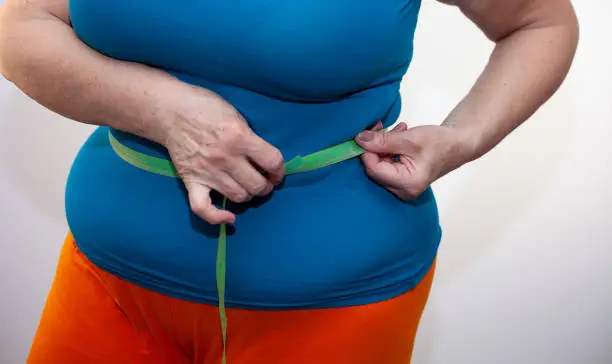Menopause marks a significant transition in a woman’s life, often accompanied by stubborn belly fat that feels impossible to shed. Hormonal shifts, slower metabolism, and lifestyle changes can make weight management challenging—but not unachievable. In this guide, we’ll explore practical, science-backed strategies to reduce belly fat during menopause, supported by research from leading health authorities like the National Institutes of Health (NIH) and the CDC. Let’s reclaim control over your health and confidence!
Why Menopause Causes Belly Fat
- Hormonal Changes
Declining estrogen levels during menopause shift fat storage from the hips and thighs to the abdomen. This visceral fat surrounds organs and is linked to higher risks of heart disease and diabetes (Harvard Medical School). - Slower Metabolism
Muscle mass decreases with age, slowing your resting metabolic rate by 3–5% per decade after 30 (Mayo Clinic). - Insulin Resistance
Hormonal fluctuations can impair insulin sensitivity, promoting fat storage around the midsection (NIH Study). - Lifestyle Factors
Stress, poor sleep, and reduced physical activity exacerbate weight gain during menopause.
6 Science-Backed Strategies to Reduce Belly Fat
1. Prioritize Protein and Fiber
What to Do:
- Aim for 25–30g of protein per meal (e.g., eggs, Greek yogurt, lentils) to preserve muscle and curb cravings.
- Eat 25–35g of fiber daily from vegetables, berries, and chia seeds to improve insulin sensitivity.
Why It Works:
A study in The American Journal of Clinical Nutrition found that high-fiber diets reduce visceral fat by 3.7% over five years (NIH).
2. Strength Training: Build Muscle, Burn Fat
What to Do:
- Lift weights 2–3x weekly, focusing on compound movements (squats, deadlifts).
- Add resistance bands or bodyweight exercises if new to strength training.
Why It Works:
Muscle burns more calories at rest than fat. The CDC recommends strength training to counteract age-related muscle loss.
3. Manage Stress to Lower Cortisol
What to Do:
- Practice yoga, meditation, or deep breathing for 10–15 minutes daily.
- Try adaptogens like ashwagandha, shown to reduce cortisol levels (NIH Study).
Why It Works:
Chronic stress raises cortisol, driving fat storage around the abdomen.
4. Optimize Sleep Quality
What to Do:
- Aim for 7–9 hours nightly.
- Avoid screens 1 hour before bed and keep your bedroom cool (60–67°F).
Why It Works:
Poor sleep disrupts hunger hormones (ghrelin and leptin), increasing cravings for sugary, high-calorie foods (National Institute on Aging).
5. Cut Added Sugars and Refined Carbs
What to Avoid:
- Sugary drinks, pastries, white bread, and processed snacks.
Why It Works:
Refined carbs spike blood sugar, worsening insulin resistance. Swap them for complex carbs like sweet potatoes and quinoa.
6. Try HIIT for Efficient Fat Burning
What to Do:
- Alternate 30 seconds of sprinting/jumping jacks with 1 minute of rest. Repeat for 15–20 minutes.
Why It Works:
High-intensity interval training (HIIT) burns visceral fat 3x faster than steady-state cardio (NIH Study).
Sample Menopause-Friendly Meal Plan
- Breakfast: Spinach omelet with avocado + blackberries.
- Lunch: Grilled chicken salad with quinoa, walnuts, and olive oil dressing.
- Snack: Almond butter with celery sticks.
- Dinner: Baked salmon with roasted Brussels sprouts and cauliflower rice.
- Dessert: Dark chocolate (70%+) with raspberries.
FAQs: Your Menopause Belly Fat Questions Answered
Q: Why is belly fat harder to lose after menopause?
A: Lower estrogen levels increase fat storage in the abdomen while reducing muscle mass.
Q: Are there supplements that help?
A: Vitamin D, magnesium, and omega-3s may support metabolism. Consult your doctor before starting new supplements.
Q: Can HRT (Hormone Replacement Therapy) help?
A: HRT may reduce visceral fat in some women, but risks vary. Discuss options with a healthcare provider (NIH).
Long-Term Tips for Sustainable Results
- Track Progress: Use a food diary or app like MyFitnessPal to monitor macros.
- Stay Consistent: Focus on small, sustainable changes rather than quick fixes.
- Get Support: Join communities like the North American Menopause Society for resources.
Final Thoughts
Reducing belly fat during menopause requires a holistic approach: balance hormones with nutrient-dense foods, build muscle through strength training, and prioritize stress management. For personalized guidance, explore the Dietary Guidelines for Americans or consult a registered dietitian specializing in menopause.
Remember, this journey isn’t about perfection—it’s about progress. Celebrate every small win, and trust your body’s resilience!
Reduce Belly Fat

Struggling with stubborn weight, slow metabolism, or bloating? LeanBiome is a science-backed probiotic formula designed to support gut health, boost metabolism, and accelerate fat loss—naturally!
Why Choose LeanBiome for Weight Loss?
✅ Rebalances gut bacteria for better fat burning
✅ Boosts metabolism & energy levels
✅ Reduces cravings & supports digestion
✅ Clinically proven ingredients for real results
